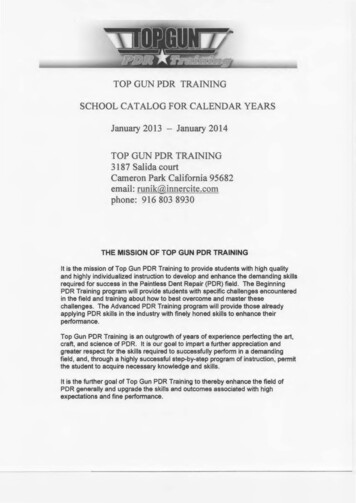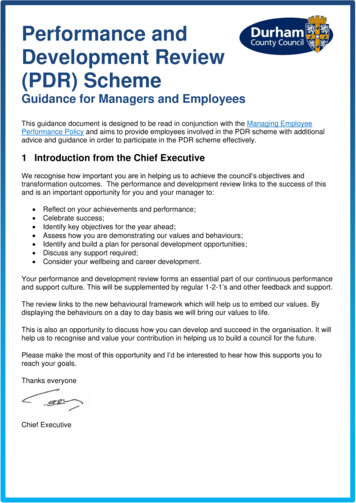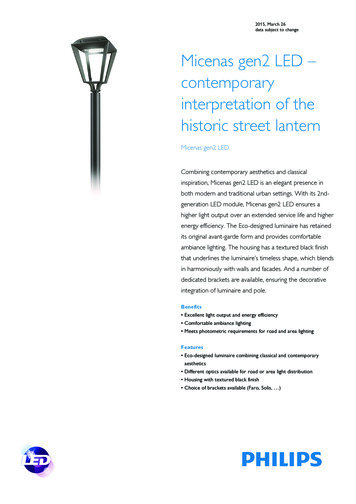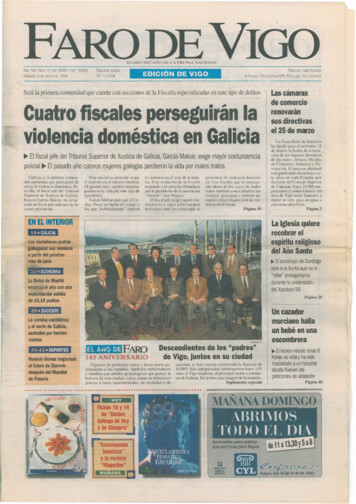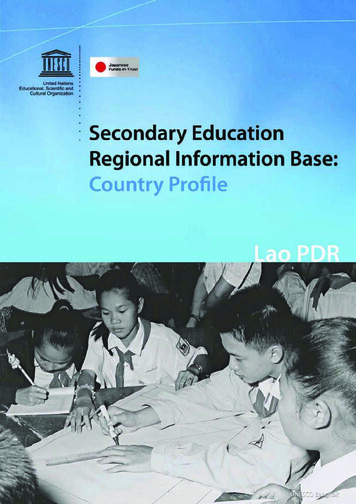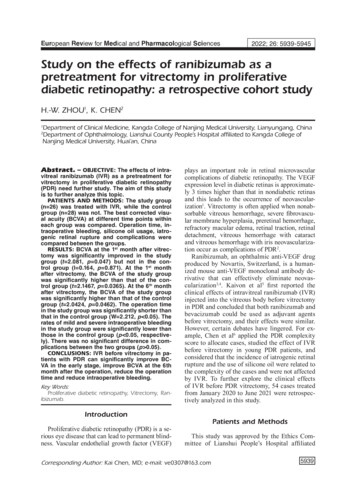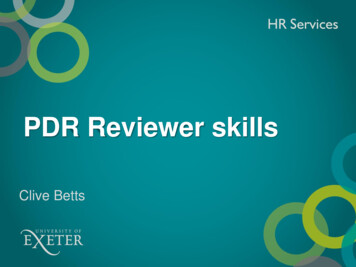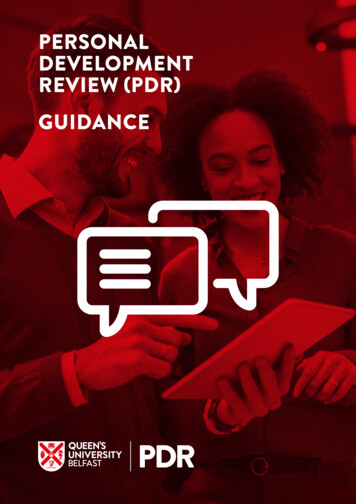
Transcription
PERSONALDEVELOPMENTREVIEW (PDR)GUIDANCE
QUEEN’SUNIVERSITYBELFASTPERSONALDEVELOPMENT REVIEWGUIDANCECONTENTS1.PDR Purpose . 022.PDR Terminology Explained . 033.PDR Benefits . 034. PDR Cycle . 045.i.ii.iii.iv.v.PDR Process . 05The PDR Form . 06The Annual PDR Meeting . 06PDR Conversations .07Appeal . 07Development Themes . 076.Diversity and Inclusion Mitigating Circumstances . 087.PDR Skills . 098. Further Support . 10Appendix 1 - Completing the form . 11PAGE01
QUEEN’SUNIVERSITYBELFAST1.PERSONALDEVELOPMENT REVIEWGUIDANCEPERSONAL DEVELOPMENTREVIEW (PDR) PURPOSEPersonal Development Review (PDR) adopts a developmental approach in support ofour People First promise to “create opportunities to build the capability of our staff”.PDR provides the framework for an ongoing conversation between Reviewer andReviewee, to review progress against previously agreed Priorities; discuss future plansand career aspirations; co-create future Priorities and Development Goals; and planrelevant and appropriate support.PAGE02QUEEN’SUNIVERSITYBELFAST2.The key to a successful PDR is the meaningful, ongoing conversations between Reviewerand Reviewee that leads to quality outcomes for the Reviewee, for example, improvedeffectiveness within current role and achievement of their Development Goals.PERSONALDEVELOPMENT REVIEWGUIDANCEPDR TERMINOLOGY EXPLAINEDREVIEWEEAll Queen’s employees should take part in PDR, therefore all staff are Reviewees.Reviewees with their Reviewers agree their Priorities and Development Goals, whilereflecting on their career aspirations and their contribution to the success of Queen’s.Each Reviewee is responsible for their own career and development.REVIEWERFor Research and Professional Services staff, your Reviewer is normally your linemanager (unless otherwise advised). For Academic staff, your Reviewer may be yourHead of School, however, in larger Schools the Head of School may delegate theReviewer role to, for example, the Discipline Lead, or a more senior academic colleague.If the Reviewee is unclear who their Reviewer is, they should contact their Headof School or line manager.PDR enables Reviewees, with the appropriate support of their Reviewer, to takeownership for and drive forward their own career and development plans, and in turn,understand how they are personally contributing to the success of our University.PRIORITIESPriorities relate to key activities relevant to the Reviewee’s role rather thana day-to-day task list. Therefore, Reviewees should have between three and fivePriorities only, typically over a 12 month period.DEVELOPMENT GOALSDevelopment Goals are intended to bridge gaps in the Reviewee’s current skills,knowledge and/or support the Reviewee’s longer-term career developmentaspirations. Development Goals must be appropriate and relevant to the Reviewee’srole, and Reviewees should have no more than four Development Goals over any12 month period.Whilst some staff may wish to progress, others will be content in their current roleor grade. In these circumstances, there will also be development options to widenknowledge and skills.A full Glossary will be available on the website: go.qub.ac.uk/PDRinfo3.PDR BENEFITSPDR prioritises the ongoing conversations between Reviewer and Revieweethroughout the year - whether formal or informal. P DR conversations allow Reviewers and Reviewees to build a positive workingrelationship where the Reviewee receives regular feedback and support in meetingtheir Priorities and Development Goals. PDR prioritises staff development and progression and enables Reviewees to takecontrol of their career and development plan. The new PDR process is more streamlined and less bureaucratic.PAGE03
QUEEN’SUNIVERSITYBELFAST4.PERSONALDEVELOPMENT REVIEWGUIDANCEPAGE04PDR CYCLEThe PDR process is an annual cycle aligned to the academic year throughout whichReviewers and Reviewees are encouraged to have meaningful ongoing conversations.These conversations can be formal or informal and can form part of existing meetings.Within each PDR cycle, Reviewers and Reviewees should hold an Annual PDRMeeting, which normally takes place between June and September. This annualmeeting is to review progress against previously agreed Priorities and DevelopmentGoals, and to discuss and agree future Priorities, Development Goals andcareer VELOPMENT REVIEWGUIDANCEPDR PROCESSFaculty Pro-Vice-Chancellors/Registrar and Chief Operating Officer will ensure thatinstitutional Priorities are cascaded across the University.Heads of Schools/Directors are responsible for identifying Reviewers, meeting withthem to communicate local/institutional Priorities and ensure clarity around theirPDR roles and responsibilities.At Queen’s, how we do things is equally as important as what we do. Our CoreValues, ICARE: go.qub.ac.uk/I-CARE, set out the behaviours that help createa positive working environment where all staff can achieve their potential. PDRprovides an opportunity to reinforce our values and recognise positive behavioursthrough appropriate feedback during PDR conversations. Reviewers andReviewees will integrate these values, into the discussions about Priorities andDevelopment Goals.PDR CONVERSATIONSJUNENANDR MEETUAL PINGPAGE05COTPHEDRFONRMR IOPD SATREVNSENPM SOELVE EMDE THTLUA GN INAN EETETH R MPDSEPTEMBERThe Reviewer will be responsible for initiating the PDR process by scheduling ameeting with the Reviewee.ONGOINGCONVERSATIONSBOTH THE REVIEWER AND REVIEWEE ARE RESPONSIBLE FOR: B eing aware of their role and responsibilities in the PDR process and thepreparation required by them in advance of PDR meetings. Being aware of the range of development opportunities including:- e xperiences at work (new responsibilities, involvement in a working/projectgroup, job shadowing and secondments);- formal learning (face-to-face or online, structured courses or qualifications);and- s ocial learning by interacting with others (mentoring, networking, etc.). Ensuring PDR forms are submitted one week before the Annual PDR Meeting. Agreeing Priorities aligned to School/Directorate plans. Review at the Annual PDR Meeting the outputs and contribution against Prioritiesand the impact Development Goals have had, reflecting on their behaviours in linewith our Core Values, ICARE, and any appropriate feedback required. Considering Priorities and Development Goals for the new academic year in linewith career aspirations and to increase capability.
QUEEN’SUNIVERSITYBELFASTPERSONALDEVELOPMENT ONALDEVELOPMENT REVIEWGUIDANCETHE PDR FORMPDR CONVERSATIONSThe PDR form is the document used to record the Reviewee’s Priorities andDevelopment Goals agreed at the Annual PDR Meeting, and to documentcontribution aligned with Priorities and Development Goals. There are two PDRforms, one for Academic staff and one for Research and Professional Services staff.Guidance on completing the form can be found in Appendix 1. Clinical Academicswill also complete the Queen’s Academic PDR form, this is in addition to any otherrequirements for an annual review as determined by their Professional Body.The underlying principle of the PDR process is the commitment to have ongoing,meaningful conversations.In order to have a record of conversations, the PDR form does need to be completedon an annual basis. However, while the PDR Form is a useful tool for guidingthe Annual PDR Meeting, it is important to remember that regular, ongoingconversations between Reviewer and Reviewee are the single most important aspectof PDR. If you wish to make amendments to the form to suit your role, or use a localform, please agree this with your Reviewer.The Reviewer and Reviewee have the flexibility to agree the frequency of interimmeetings. Either person is able to make a request and meetings can either be formalor informal. It is recommended that these conversations will form part of existingmeeting structures, such as one-to-one catch ups. Best practice suggests havingquarterly meetings, and as a minimum, at least one interim meeting dedicated tocontinuing the PDR discussions should take place during the academic year.In advance of the Annual PDR Meeting, the Reviewee should download the relevantblank PDR form from the website here: go.qub.ac.uk/PDRinfoTHE ANNUAL PDR MEETINGThe Reviewer is responsible for scheduling and leading the meeting, and ensuring thatall elements are given due consideration.AT THE MEETING THE REVIEWER AND REVIEWEE WILL: D iscuss the degree to which Priorities for the previous academic year have beenachieved, consider any challenges, obstacles or mitigating factors which may havecontributed to this. Provide constructive two-way feedback on the previous academic year. Discuss the degree to which Development Goals have been achieved on previouslyidentified skills gaps. Discuss and agree Priorities for the new academic year. Discuss career aspirations and agree* appropriate Development Goals for thenew academic year and how these may be achieved. At the end of the meeting the Reviewer will advise on next steps, which includes,finalising the form and timeframe for completion.* Where it is not possible to approve a development request at the meeting, it is the Reviewer’s responsibility toseek approval and to share the outcome of the request with the Reviewee.AFTER THE MEETING THE REVIEWER WILL: Complete the following sections of the PDR Form:- their comments on the Reviewee’s contribution against Priorities andDevelopment Goals;- the End of Review Period summary section; and- the Priorities and Development Goals for the next review period. Send a copy of the completed form to the Reviewee, with both the Reviewerand Reviewee keeping a copy of the form. Follow up on any development requests that could not be agreed at the meeting.The purpose of these conversations are to follow up and build on the discussions thattook place at the Annual PDR Meeting. They also provide an opportunity to reviewPriorities and consider any skills gaps, and developmental actions required to closethese gaps.Reviewers are also responsible for identifying and celebrating success and shouldtake the opportunity to recognise work well done and the positive contributionsof Reviewees throughout the academic year. Please refer to the STAR (StaffRecognition) Scheme Guidance for more information: go.qub.ac.uk/STARSchemePDR should not be used as a means to manage poor performance and anysubstantive issues should not be raised for the first time through a PDR meeting.However, where appropriate development interventions have not contributed tosatisfactory improvement, then it may be necessary to move into formal procedures.The University’s Capability & Disciplinary procedures will be used to help managepoor performance.APPEALThe objective of all PDR conversations is to achieve agreement between theReviewer and Reviewee and the Annual PDR Meeting should emphasise this principlethroughout. However, if agreement cannot be reached on what should be recorded,the Reviewee should submit an appeal to the Reviewer’s line manager (or next seniorperson) provided there is a procedural or substantive reason for doing so.The outcome of the appeal is final.DEVELOPMENT THEMESAfter the Annual PDR Meetings have taken place the Heads of Schools/Directorsare required to feedback any key development themes to their Human ResourcesBusiness Partners.PAGE07
QUEEN’SUNIVERSITYBELFAST6.PERSONALDEVELOPMENT REVIEWGUIDANCEDIVERSITY AND INCLUSION –MITIGATING CIRCUMSTANCESThe University recognises that there may be individual circumstances which haveimpacted on a Reviewee’s ability to meet Priorities and/or Development Goals withinthe academic year.CIRCUMSTANCES MAY INCLUDE: maternity, paternity, parental or adoption leave, or other family leave; part-time working; periods of absence arising from ill-health, including disability or long termcondition, mental health, or injury; periods of absence arising from gender reassignment; career breaks; personal, family (for example, caring responsibilities) or other non-academiccircumstances that have impacted on work for a sustained period; or secondments and previous employment.Priorities and Development Goals may be carried over to the new academic year.Care must be taken not to overburden the employee on their return to work andthe Priorities and Development Goals must be achievable.The PDR meetings will provide an opportunity for the Reviewer and Reviewee todiscuss any reasonable adjustments that may be required to achieve Priorities andDevelopment Goals.For more information on the Diversity and Inclusion Policy,visit: ELFAST7.PERSONALDEVELOPMENT REVIEWGUIDANCEPDR SKILLSAs well as understanding the different roles within the new PDR process, Reviewersand Reviewees will need to consider the skills required to have meaningful ongoingconversations, which support the best contribution and development.PDR skills workshops and resources are offered on an ongoing basis for Reviewersand Reviewees to build skills for PDR when they are needed. Workshops andadditional downloadable learning resources* are available to support the transitionfrom Appraisal to PDR. These learning resources will recognise the existing skillsand experience that many staff already have in reviewing, and aim to develop thesefurther in order to build the confidence required for PDR conversations to beeffective. The aim of this support is to enable Reviewers and Reviewees to: Understand the importance and benefits of PDR.Consider ‘ownership’ for Priorities, Development Goals and career aspirations.Prepare for ongoing conversations throughout the review period.Utilise practical models and tools for:- Reflecting on personal strengths and areas for development;- Goal setting;- Planning for PDR conversations;- Exploring examples of continuous conversations;- Adopting a coaching style; Understanding the range of learning and development opportunities availableat Queen’s.Visit: go.qub.ac.uk/PDR-support to access details of PDR skills workshops andadditional resources available.* The PDR Skills Workshops and downloadable learning resources will not focus on the process of PDR itself.This information is available in this booklet and on the PDR webpages.PAGE09
QUEEN’SUNIVERSITYBELFASTPERSONALDEVELOPMENT ONALDEVELOPMENT REVIEWGUIDANCEAPPENDIX 1 – COMPLETINGTHE FORMIn advance of the Annual PDR Meeting, the Reviewee should download the relevantform from the website: go.qub.ac.uk/PDRinfo complete the relevant sections andsubmit to their Reviewer one week in advance of the meeting.The Guidelines below explain exactly what is required from Reviewer and Revieweeat each section of the form. A maximum word count has been included in eachsection as a guideline only; these are not intended as a target word count, ratherthe maximum words that should be entered in each section.SECTION 1 – PRIORITIESThis section should be used to reflect on the Reviewee’s Priorities for the previousacademic year and will provide the basis for the initial discussion between Reviewerand Reviewee at the Annual PDR Meeting. It provides the opportunity to reflecton the Reviewee’s contribution during the previous academic year and the extentto which they have achieved their Priorities.MENTORINGMentoring is a valuable approach to support personal development and the PDRprocess. Many staff have access to existing mentoring opportunities co-ordinatedin Queen’s. Mentoring relationships can also develop on an informal basis withcolleagues having structured conversations (typically outside Manager/Reviewerrelationship). Additional resources on mentoring are available from the website:go.qub.ac.uk/mentoring-guide for staff to access guidance to understand mentoring,information about schemes in place in Queen’s and how to access skills developmentfor mentoring.LEADERSHIP AND MANAGEMENT FRAMEWORK8.The Queen’s Leadership and Management Framework aims to guide andsupport current and aspiring managers and leaders. The Framework:go.qub.ac.uk/LM-Framework clearly sets out the behaviours and skills requiredto lead and manage at Queen’s across all levels of leadership. This Framework andthe accompanying self-assessment tool is therefore a valuable resource for PDRdiscussions, helping identifying areas for development, and framing careerprogression discussions.FURTHER SUPPORTIf Reviewees and Reviewers have further queries about PDR, there are a numberof avenues for further support: People & Culture website: go.qub.ac.uk/PeopleandCultureYour Head of School/line managerHR HUB, ext. 300/hrhub@qub.ac.ukYour Human Resources Business PartnerUnder the heading, ‘Reviewee Achievement’, the Reviewee should outline theirachievements against each Priority, noting any changes to this Priority throughoutthe academic year, and any challenges, obstacles or mitigating factors that may havecontributed to this as well as any feedback they have received. This section shouldbe completed by the Reviewee in advance of the Annual PDR Meeting and willbe discussed by Reviewee and Reviewer during the meeting. The Reviewee shouldinclude any evidence of how they have acted in line with the Core Values, ICARE,when completing their Priorities.Under the heading, ‘Reviewer Comments’, the Reviewer should consider theReviewee’s achievements against each Priority in advance of the Annual PDRMeeting. The Reviewer should complete this section after the meeting hastaken place and the comments should reflect the discussion betweenReviewee and Reviewer.PAGE11
QUEEN’SUNIVERSITYBELFASTPERSONALDEVELOPMENT REVIEWGUIDANCESECTION 2 - DEVELOPMENT GOALSThis section of the form should be used to inform a discussion at the Annual PDRMeeting between the Reviewer and Reviewee about their development needs andcareer aspirations, as appropriate and relevant to their role.Under the heading, ‘Reviewee Achievement’, the Reviewee should outline theirachievements against each Development Goal and the impact (if any) this has hadon their ability to carry out their role. The Reviewee should note any changes to thisDevelopment Goal throughout the academic year, and any challenges, obstaclesor mitigating factors which may have contributed to this. This section should becompleted by the Reviewee in advance of the Annual PDR Meeting and will bediscussed by Reviewee and Reviewer during the meeting.Under the heading, ‘Reviewer Comments’, the Reviewer should consider theReviewee’s achievements against each Development Goal in advance of the AnnualPDR Meeting. The Reviewer should complete this section after the meeting has takenplace and the comments should reflect the discussion between Reviewee and Reviewer.SECTION 3 - END OF REVIEW PERIOD SUMMARYThis section of the form should be used to provide a high-level summary of theprevious academic year. It should not duplicate the information detailed underSections 1 and 2, rather should highlight key achievements, challenges faced andfeedback received and include a statement of overall progress. The Reviewee shouldcomplete the relevant section in advance of the Annual PDR Meeting to providean overall statement of how they feel they have contributed within their role, inline with the ICARE values, and how they have engaged with relevant developmentopportunities throughout the previous academic year. This summary statementshould be a reflection of the ongoing PDR conversations that have taken placebetween Reviewee and Reviewer throughout the academic year.SECTION 4 – PRIORITIES AND DEVELOPMENT GOALSFOR THE NEW REVIEW PERIODThis section should be used to inform conversations between Reviewee and Reviewerabout relevant and appropriate Priorities and Development Goals for the upcomingReview Period.In advance of the Annual PDR Review Meeting, the Reviewee should populate eachsection, Priorities and Development Goals, however, Reviewees should note thatPriorities and Development Goals need to be discussed at the Annual PDR Meetingand agreed with their Reviewer.Following the Annual PDR Meeting, the Reviewer will record the Priorities andDevelopment Goals as agreed at the meeting and return this form to the Reviewee.The Reviewee should then transfer this information to a new PDR form for theupcoming academic year.PAGE12
Queen’s University BelfastUniversity Road,Belfast, BT7 1NN,Northern IrelandTel: 44 (0)28 9024 5133Registered charity number: NIC 101788
PDR enables Reviewees, with the appropriate support of their Reviewer, to take ownership for and drive forward their own career and development plans, and in turn, understand how they are personally contributing to the success of our University. 1. PAGE 03 PAGE 02 PDR BENEFITS PDR prioritises the ongoing conversations between Reviewer and Reviewee
